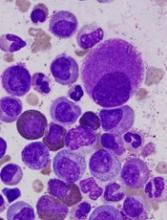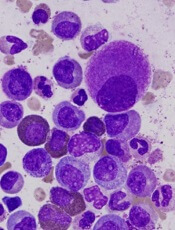User login
The US Food and Drug Administration (FDA) has expanded the approved use of dasatinib (Sprycel®).
The drug is now approved to treat children with Philadelphia chromosome-positive (Ph+) chronic myeloid leukemia (CML) in chronic phase.
This approval was granted under priority review, and the drug received orphan designation for this indication.
The recommended starting dosage for dasatinib in pediatric patients with chronic phase, Ph+ CML is based on body weight.
The recommended dose should be administered orally once daily, and the dose should be recalculated every 3 months based on changes in body weight or more often if necessary.
For more details, see the full prescribing information.
Dasatinib is also approved by the FDA to treat adults with newly diagnosed chronic phase, Ph+ CML; chronic, accelerated, or myeloid/lymphoid blast phase Ph+ CML with resistance or intolerance to prior therapy including imatinib; and Ph+ acute lymphoblastic leukemia with resistance or intolerance to prior therapy.
Pediatric studies
The approval of dasatinib in pediatric CML patients was supported by 2 studies. Results from the phase 1 study (NCT00306202) were published in the Journal of Clinical Oncology in 2013. Phase 2 (NCT00777036) results were presented at the 2017 ASCO Annual Meeting.
There were 97 patients in the 2 studies who had chronic phase CML and received oral dasatinib—17 from phase 1 and 80 from phase 2. Fifty-one of the patients had newly diagnosed CML, and 46 patients were resistant or intolerant to previous treatment with imatinib.
Ninety-one patients received dasatinib at 60 mg/m2 once daily (maximum dose of 100 mg once daily for patients with high body surface area). Patients were treated until disease progression or unacceptable toxicity.
The median duration of treatment was 51.1 months, or 4.3 years (range, 1.9 to 99.6 months). The median follow-up was 4.5 years in the newly diagnosed patients and 5.2 years in patients who had previously received imatinib.
The efficacy endpoints were complete cytogenetic response (CCyR), major cytogenetic response (MCyR), and major molecular response (MMR).
At 12 months, the CCyR rate was 96.1% in newly diagnosed patients and 78.3% in patients who had prior treatment with imatinib. The MCyR rate was 98.0% and 89.1%, respectively. And the MMR rate was 56.9% and 39.1%, respectively.
At 24 months, the CCyR rate was 96.1% in newly diagnosed patients and 82.6% in patients who had prior treatment with imatinib. The MCyR rate was 98.0% and 89.1%, respectively. And the MMR rate was 74.5% and 52.2%, respectively.
The median durations of CCyR, MCyR and MMR could not be estimated, as more than half of the responding patients had not progressed at the time of data cut-off.
Drug-related serious adverse events were reported in 14.4% of dasatinib-treated patients. The most common adverse events (≥15%) were headache (28%), nausea (20%), diarrhea (21%), skin rash (19%), pain in extremity (19%), and abdominal pain (16%). ![]()
The US Food and Drug Administration (FDA) has expanded the approved use of dasatinib (Sprycel®).
The drug is now approved to treat children with Philadelphia chromosome-positive (Ph+) chronic myeloid leukemia (CML) in chronic phase.
This approval was granted under priority review, and the drug received orphan designation for this indication.
The recommended starting dosage for dasatinib in pediatric patients with chronic phase, Ph+ CML is based on body weight.
The recommended dose should be administered orally once daily, and the dose should be recalculated every 3 months based on changes in body weight or more often if necessary.
For more details, see the full prescribing information.
Dasatinib is also approved by the FDA to treat adults with newly diagnosed chronic phase, Ph+ CML; chronic, accelerated, or myeloid/lymphoid blast phase Ph+ CML with resistance or intolerance to prior therapy including imatinib; and Ph+ acute lymphoblastic leukemia with resistance or intolerance to prior therapy.
Pediatric studies
The approval of dasatinib in pediatric CML patients was supported by 2 studies. Results from the phase 1 study (NCT00306202) were published in the Journal of Clinical Oncology in 2013. Phase 2 (NCT00777036) results were presented at the 2017 ASCO Annual Meeting.
There were 97 patients in the 2 studies who had chronic phase CML and received oral dasatinib—17 from phase 1 and 80 from phase 2. Fifty-one of the patients had newly diagnosed CML, and 46 patients were resistant or intolerant to previous treatment with imatinib.
Ninety-one patients received dasatinib at 60 mg/m2 once daily (maximum dose of 100 mg once daily for patients with high body surface area). Patients were treated until disease progression or unacceptable toxicity.
The median duration of treatment was 51.1 months, or 4.3 years (range, 1.9 to 99.6 months). The median follow-up was 4.5 years in the newly diagnosed patients and 5.2 years in patients who had previously received imatinib.
The efficacy endpoints were complete cytogenetic response (CCyR), major cytogenetic response (MCyR), and major molecular response (MMR).
At 12 months, the CCyR rate was 96.1% in newly diagnosed patients and 78.3% in patients who had prior treatment with imatinib. The MCyR rate was 98.0% and 89.1%, respectively. And the MMR rate was 56.9% and 39.1%, respectively.
At 24 months, the CCyR rate was 96.1% in newly diagnosed patients and 82.6% in patients who had prior treatment with imatinib. The MCyR rate was 98.0% and 89.1%, respectively. And the MMR rate was 74.5% and 52.2%, respectively.
The median durations of CCyR, MCyR and MMR could not be estimated, as more than half of the responding patients had not progressed at the time of data cut-off.
Drug-related serious adverse events were reported in 14.4% of dasatinib-treated patients. The most common adverse events (≥15%) were headache (28%), nausea (20%), diarrhea (21%), skin rash (19%), pain in extremity (19%), and abdominal pain (16%). ![]()
The US Food and Drug Administration (FDA) has expanded the approved use of dasatinib (Sprycel®).
The drug is now approved to treat children with Philadelphia chromosome-positive (Ph+) chronic myeloid leukemia (CML) in chronic phase.
This approval was granted under priority review, and the drug received orphan designation for this indication.
The recommended starting dosage for dasatinib in pediatric patients with chronic phase, Ph+ CML is based on body weight.
The recommended dose should be administered orally once daily, and the dose should be recalculated every 3 months based on changes in body weight or more often if necessary.
For more details, see the full prescribing information.
Dasatinib is also approved by the FDA to treat adults with newly diagnosed chronic phase, Ph+ CML; chronic, accelerated, or myeloid/lymphoid blast phase Ph+ CML with resistance or intolerance to prior therapy including imatinib; and Ph+ acute lymphoblastic leukemia with resistance or intolerance to prior therapy.
Pediatric studies
The approval of dasatinib in pediatric CML patients was supported by 2 studies. Results from the phase 1 study (NCT00306202) were published in the Journal of Clinical Oncology in 2013. Phase 2 (NCT00777036) results were presented at the 2017 ASCO Annual Meeting.
There were 97 patients in the 2 studies who had chronic phase CML and received oral dasatinib—17 from phase 1 and 80 from phase 2. Fifty-one of the patients had newly diagnosed CML, and 46 patients were resistant or intolerant to previous treatment with imatinib.
Ninety-one patients received dasatinib at 60 mg/m2 once daily (maximum dose of 100 mg once daily for patients with high body surface area). Patients were treated until disease progression or unacceptable toxicity.
The median duration of treatment was 51.1 months, or 4.3 years (range, 1.9 to 99.6 months). The median follow-up was 4.5 years in the newly diagnosed patients and 5.2 years in patients who had previously received imatinib.
The efficacy endpoints were complete cytogenetic response (CCyR), major cytogenetic response (MCyR), and major molecular response (MMR).
At 12 months, the CCyR rate was 96.1% in newly diagnosed patients and 78.3% in patients who had prior treatment with imatinib. The MCyR rate was 98.0% and 89.1%, respectively. And the MMR rate was 56.9% and 39.1%, respectively.
At 24 months, the CCyR rate was 96.1% in newly diagnosed patients and 82.6% in patients who had prior treatment with imatinib. The MCyR rate was 98.0% and 89.1%, respectively. And the MMR rate was 74.5% and 52.2%, respectively.
The median durations of CCyR, MCyR and MMR could not be estimated, as more than half of the responding patients had not progressed at the time of data cut-off.
Drug-related serious adverse events were reported in 14.4% of dasatinib-treated patients. The most common adverse events (≥15%) were headache (28%), nausea (20%), diarrhea (21%), skin rash (19%), pain in extremity (19%), and abdominal pain (16%). ![]()

